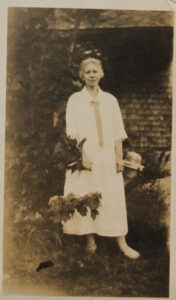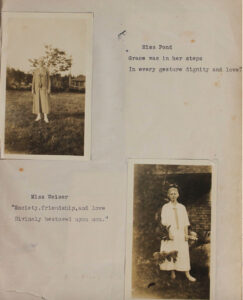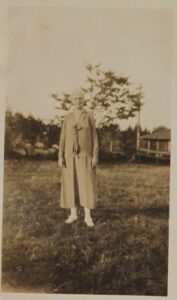This week as we celebrated International Women’s day, Runoia thoughts naturally turned to Miss Lucy Weiser and Miss Jessie Pond, our founders. We obviously know that in 1907 the role of women in society was significantly different than it is today. If you add to that the challenges of travel and how slow information sharing was, they made an incredible undertaking to even consider starting a camp for girls.
For many of us the images in our minds of Miss Weiser and Miss Pond are of old ladies, or of the portraits on the Lodge wall that capture them in one moment in time. These days their stories are somewhat steeped in legend as there are few folk at camp that actually remember them in person. I so desperately want to know more about them as young women. How did they grow up as children? How did they spend their days? What was everyday life like? Did those around them support their decision to start a camp? There are so many questions.

I often wish that I could fly back in time and sit in on their conversations and decision making. I am so curious about how and why they decided to head up to Maine to start a girls camp. It is fairly easy to research the history of the times, the camp movement and the desperate desire and search for solitude and nature outside of the rapidly developing cities. Yet why did these two particular women connect together and start our camp?
What triggered their choice to think about even considering starting a camp for girls? I doubt that they were just having tea and thought they should just pop off to Maine on a jaunt. As bright, intrepid women I am so curious about how they navigated their decisions, set out on the adventure to find a location and then built a camp. They then successfully encouraged parents to send their girls and young women off into the Maine wilderness for an unknown experience. Can you imagine all this without a webiste to promote the amazingness of Great Pond?!
It’s hard to imagine the remoteness of Maine and the lack of infrastructure that awaited those early campers. The Belgrade Historical Society has some great visuals and information about the area that was then primarily farming. In the early 1900’s Belgrade Lakes was rapidly becoming a popular area for vacations for those wealthy enough to take time away in the summer. Fine hotels on the shores of the lakes were built to accomodate a growing trend in more rural retreats.
I wish we had a time machine so that we could watch those amazing women in action.
We are so grateful for the origional two strong women and all of the others that have followed in thier footsteps.

